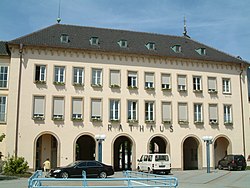Frankenthal
| Frankenthal (Pfalz) | ||
|---|---|---|

Town hall
|
||
|
||
| Coordinates: 49°32′N 8°21′E / 49.533°N 8.350°ECoordinates: 49°32′N 8°21′E / 49.533°N 8.350°E | ||
| Country | Germany | |
| State | Rhineland-Palatinate | |
| District | urban district | |
| Government | ||
| • Lord Mayor | Martin Hebich (CDU) | |
| Area | ||
| • Total | 43.78 km2 (16.90 sq mi) | |
| Population (2015-12-31) | ||
| • Total | 48,363 | |
| • Density | 1,100/km2 (2,900/sq mi) | |
| Time zone | CET/CEST (UTC+1/+2) | |
| Postal codes | 67227 | |
| Dialling codes | 06233 | |
| Vehicle registration | FT | |
| Website | frankenthal.de | |
Frankenthal (Pfalz) is a town in southwestern Germany, in the state of Rhineland-Palatinate.
Frankenthal was first mentioned in 772. In 1119 an Augustinian monastery was built here, the ruins of which — known, after the founder, as the — still stand today in the town centre.
In the second half of the 16th century, people from the Netherlands, persecuted for their religious beliefs, settled in Frankenthal. They were industrious and artistic and brought economic prosperity to the town. Some of them were important carpet weavers, jewellers and artists whose Frankenthaler Malerschule ("Frankenthal school of painting") acquired some fame. In 1577 the settlement was raised to the status of a town by the Count Palatine Johann Casimir.
In 1600 Frankenthal was converted to a fortress. In 1621 it was besieged by the Spanish during the Thirty Years' War, and then successively occupied by troops of the opposing sides. Trade and industry were ruined and the town was not reconstructed until 1682.
In 1689 the town was burnt to the ground by French troops in the War of the Grand Alliance. The town did not fully recover from this for more than fifty years.
However, in 1750, under the rule of the Elector (Kurfürst) Charles Theodore, Frankenthal was established as a centre of industry. Numerous factories were opened and mulberry trees were planted for silk production. In 1755 the famous Frankenthal porcelain factory was opened, which remained in production until 1800.
In 1797 the town came under French occupation during the French Revolutionary Wars. It passed into the rule of Bavaria in 1816.
...
Wikipedia



